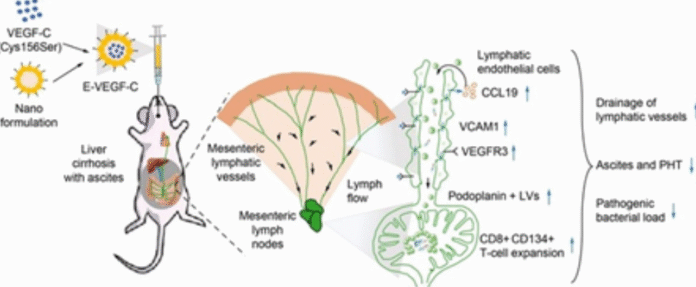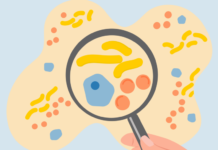NEW DELHI– Indian researchers have developed a novel therapeutic approach to treat liver cirrhosis by restoring lymphatic function in the liver and intestine using targeted nanocarriers loaded with VEGF-C, a key protein that promotes lymphatic vessel growth.
Liver cirrhosis, a progressive form of chronic liver disease, is marked by extensive scarring and disruption of both blood and lymphatic vessels. In advanced stages, patients often suffer from complications such as abdominal fluid buildup (ascites) and portal hypertension.
A joint team from the Institute of Liver and Biliary Sciences (ILBS), New Delhi, and the National Institute of Pharmaceutical Education and Research (NIPER), Guwahati, focused on improving the drainage capacity of gut and liver lymphatic vessels using vascular endothelial growth factor-C (VEGF-C), a protein known to stimulate the formation of new lymphatic vessels.
“VEGF-C activates lymphangiogenesis by binding to VEGFR-3, a key receptor essential for lymphatic development,” the researchers explained.
However, due to VEGF-C’s hydrophilic nature, short half-life, and risk of systemic side effects, the NIPER team led by Dr. Subham Banerjee developed nanocarriers using reverse micelle-based technology to encapsulate and deliver the protein more effectively. These nanocarriers specifically bind to VEGFR-3 receptors.
The ILBS team, led by Dr. Savneet Kaur, then tested the VEGF-C nanocarriers in animal models of advanced cirrhosis and portal hypertension. Delivered orally, the nanocarriers successfully targeted gut lymphatic vessels, improving mesenteric lymph drainage and reducing fluid buildup in the abdomen.
The treatment also significantly lowered portal pressures, enhanced immune function by boosting cytotoxic T-cell activity in mesenteric lymph nodes, and reduced bacterial presence in both local and systemic environments.
Published in JHEP Reports, the study is the first to demonstrate that therapeutic lymphangiogenesis via VEGF-C can effectively restore fragmented lymphatic networks, offering a promising new direction in the treatment of advanced liver cirrhosis. (Source: IANS)














